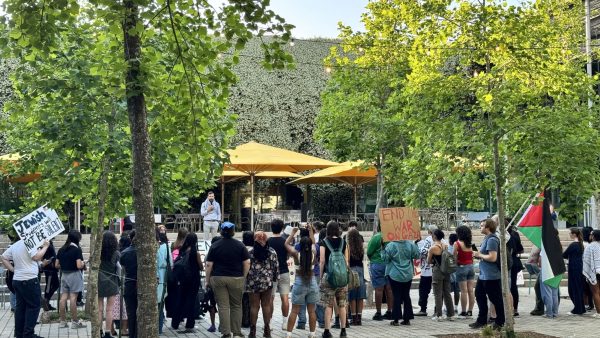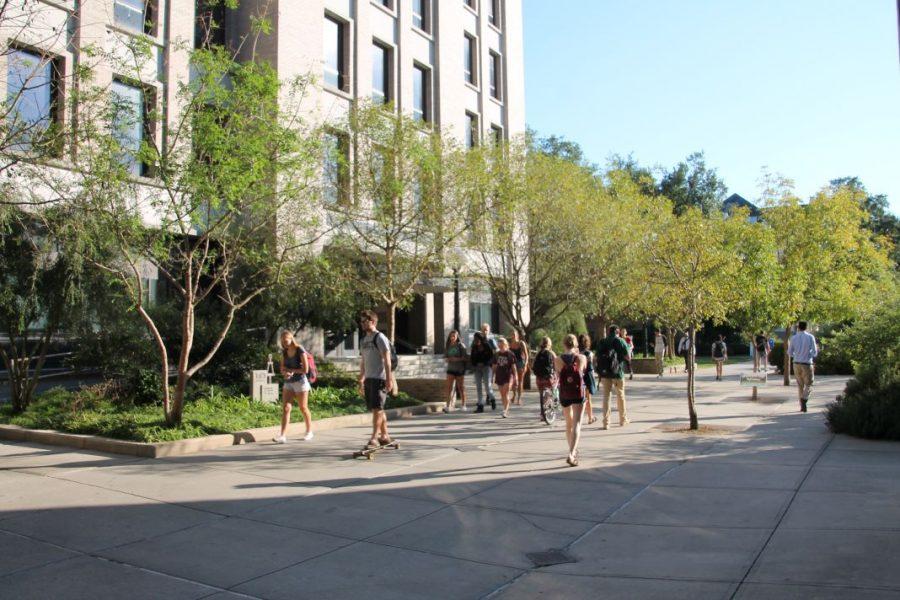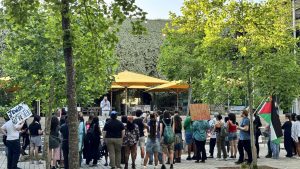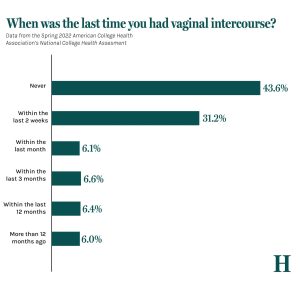Tulane faculty not comfortable with reopening, left feeling “devalued, overlooked”
Students walk past Lindy Boggs Center for Energy and Biotechnology. Boggs houses some of Tulane’s science and engineering departments, which have some of the largest gender disparities in their professorship.
August 18, 2020
The Tulane Hullabaloo is a nonprofit newsroom that receives no funding from Tulane University. Consider subscribing today to support our mission.
With the August 19 start date fast approaching, many faculty members have expressed their concerns over the reopening plan presented by the Tulane administration. The Tulane Chapter of the American Association of University Professors issued a press release on August 11 detailing information that reflects the discomfort among the Tulane faculty.
The Tulane AAUP press release highlights a level of “deep distress” among Tulane educators. Foremost of these concerns is the likelihood of Tulane “becoming a super-spreader site” in the New Orleans area. After a recent resurgence of COVID-19 in the New Orleans area, returning students have an increased chance of spreading the disease to surrounding areas. Given the racial demographic of the New Orleans area, educators fear that students not adhering to safety requirements will result in an increase of cases among Black and Latinx populations, who have had higher death rates from the virus when compared to white populations.
The press release credits an internal survey conducted by the Tulane AAUP during mid-July that is comprised of input from approximately 700 Tulane faculty members. Of those faculty members, 59% are found to be uncomfortable with Tulane’s resuming of classes. Only 23% of faculty members were found to favor all students returning to campus for the fall semester.
A recurring theme in the survey points to educator’s concerns of university transparency and undergraduate students heeding Tulane’s mandate for masking and social distancing.
“I am very uncomfortable with the university’s plans, including in-person teaching,” a School of Public Health and Tropical Medicine faculty member said in their survey response. “What I find more appalling is that the faculty have not been given a choice about teaching in-person or online … The way the administration has treated faculty at Tulane through this entire process has made it clear that not only do we lack value, but that we are also dispensable.”
A faculty member from the A.B. Freeman School of Business writes, “I don’t think there is any way to expect teenagers to distance themselves 24/7 and believe there will be large COVID spikes on campus that will require a shutdown despite best efforts. I am not sure if all of these efforts are worth trying to make this in-person, on-campus semester happen during a pandemic that is not under control.”
Likewise, the survey also references a need for more flexible pedagogical methods. Having students in class, while adhering to Tulane’s social distancing guidelines and other preventative measures, appears to be counter-intuitive to some. Educators believe their teaching methods would be much more effective in a virtual setting.
Of those polled, 71% will be engaged only in hybrid teaching, which includes both in-person and virtual learning.
“Due to the uncertainty of the COVID-19, the hybrid form could put more stress/financial burden onto the students if after a couple of weeks, all the classes have to be online,” one faculty member said in their response.
Many other responses depict an inadequate accommodation process. For some educators, there appeared to be a push to teach in-person, despite their request for online teaching.
Another professor wrote, “My request for online teaching was not taken seriously and I was discouraged to pursue it.”
With Tulane resuming classes on Wednesday, the fate of students and faculty members alike appears to lie on the shoulders of the institution. For some, they look forward to business-as-usual. For others, they worry for the well-being of staff and students during this pandemic.
In the words of a faculty member in the School of Professional Advancement, “This feels like a ticking time bomb.”

























MF • Aug 22, 2020 at 9:01 am
I have family tested positive in the current ( predictable and highly opposed ) opening of the dorms… not even academics. Schools everywhere are doing this and acting like it’s ok… Tulane has always been a highly respected Medical School, please act like it !
Samuel Carroll • Aug 21, 2020 at 2:13 pm
Excellent article, tensions and sentiments are tantamount at my university.